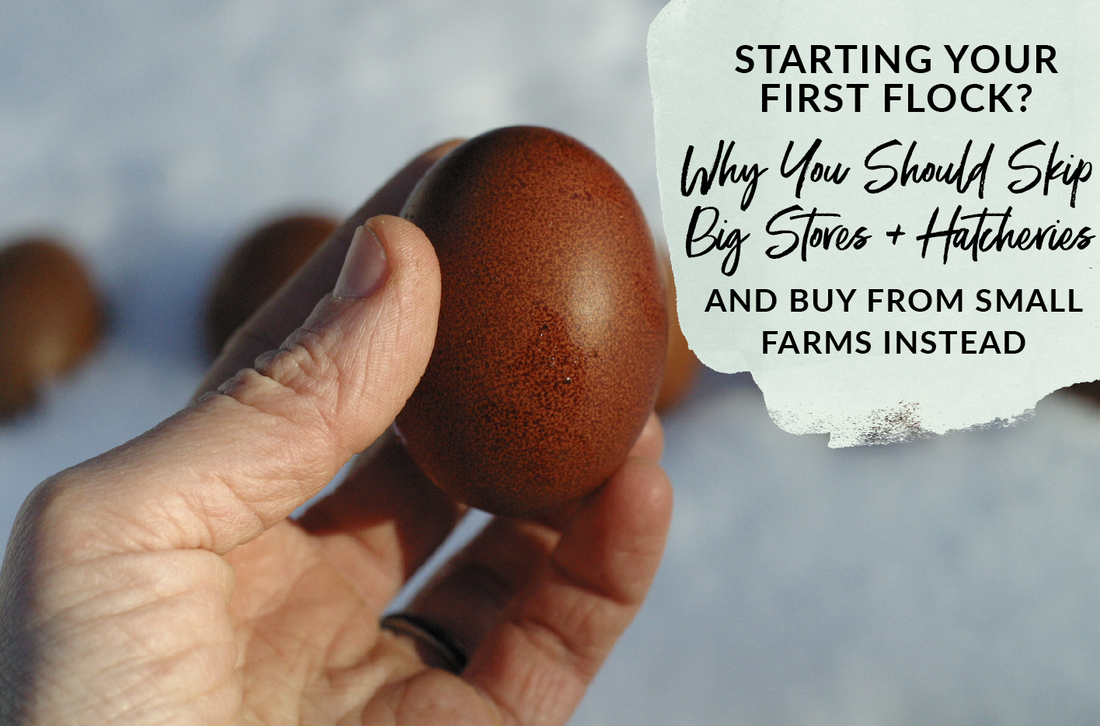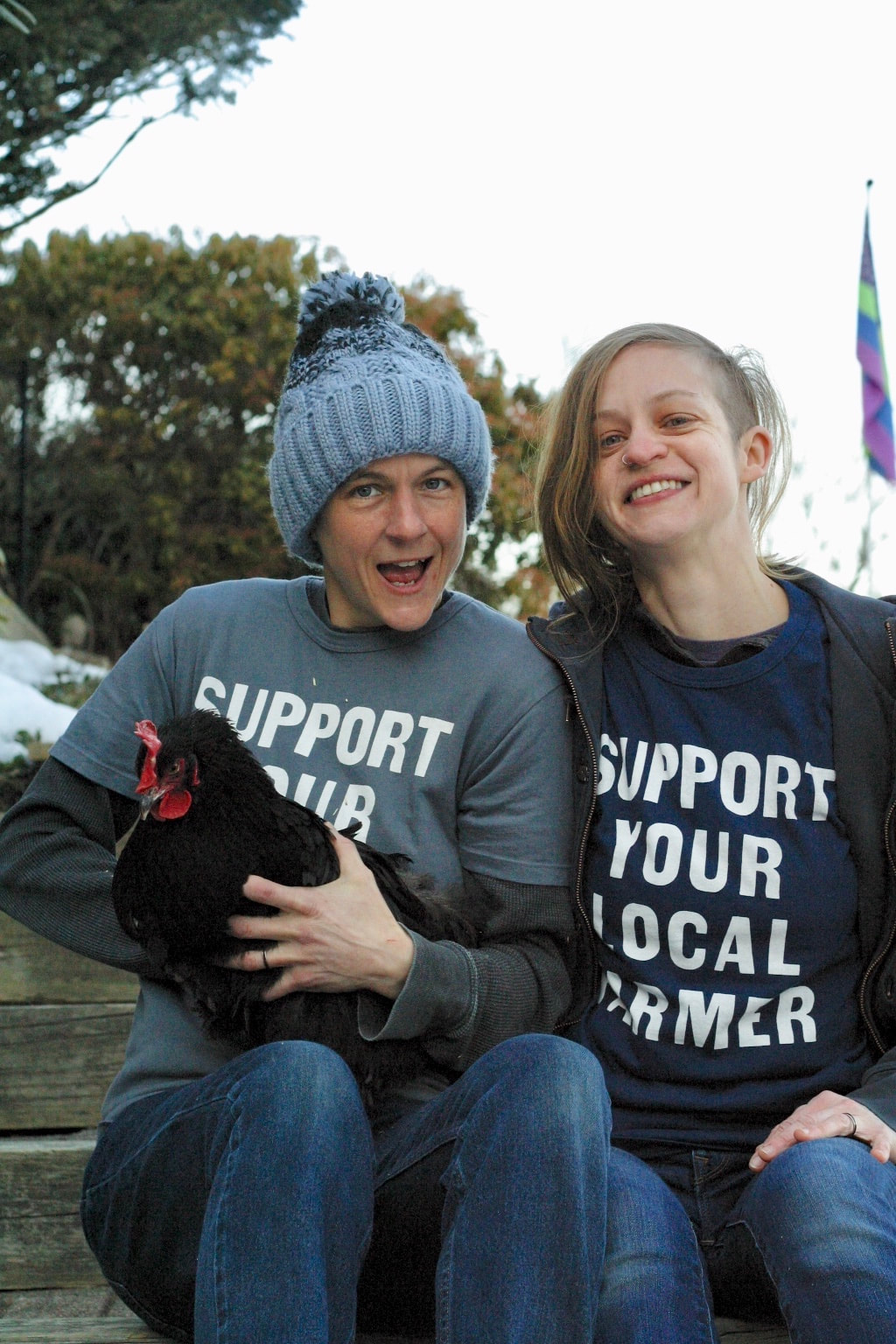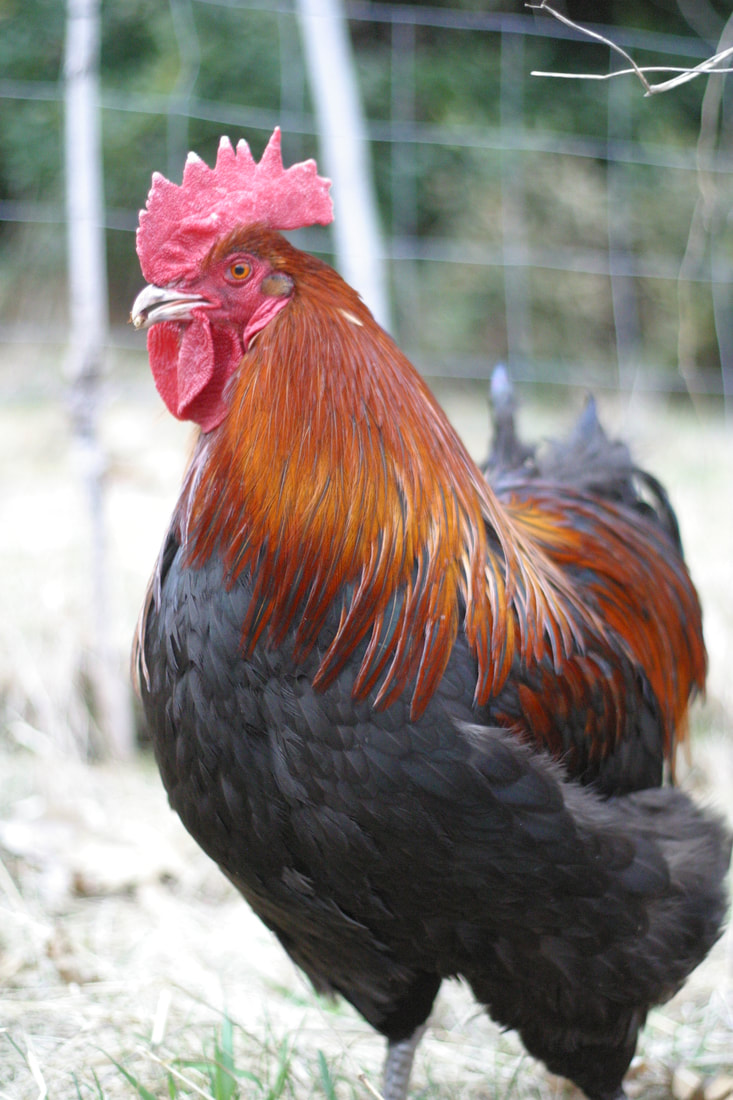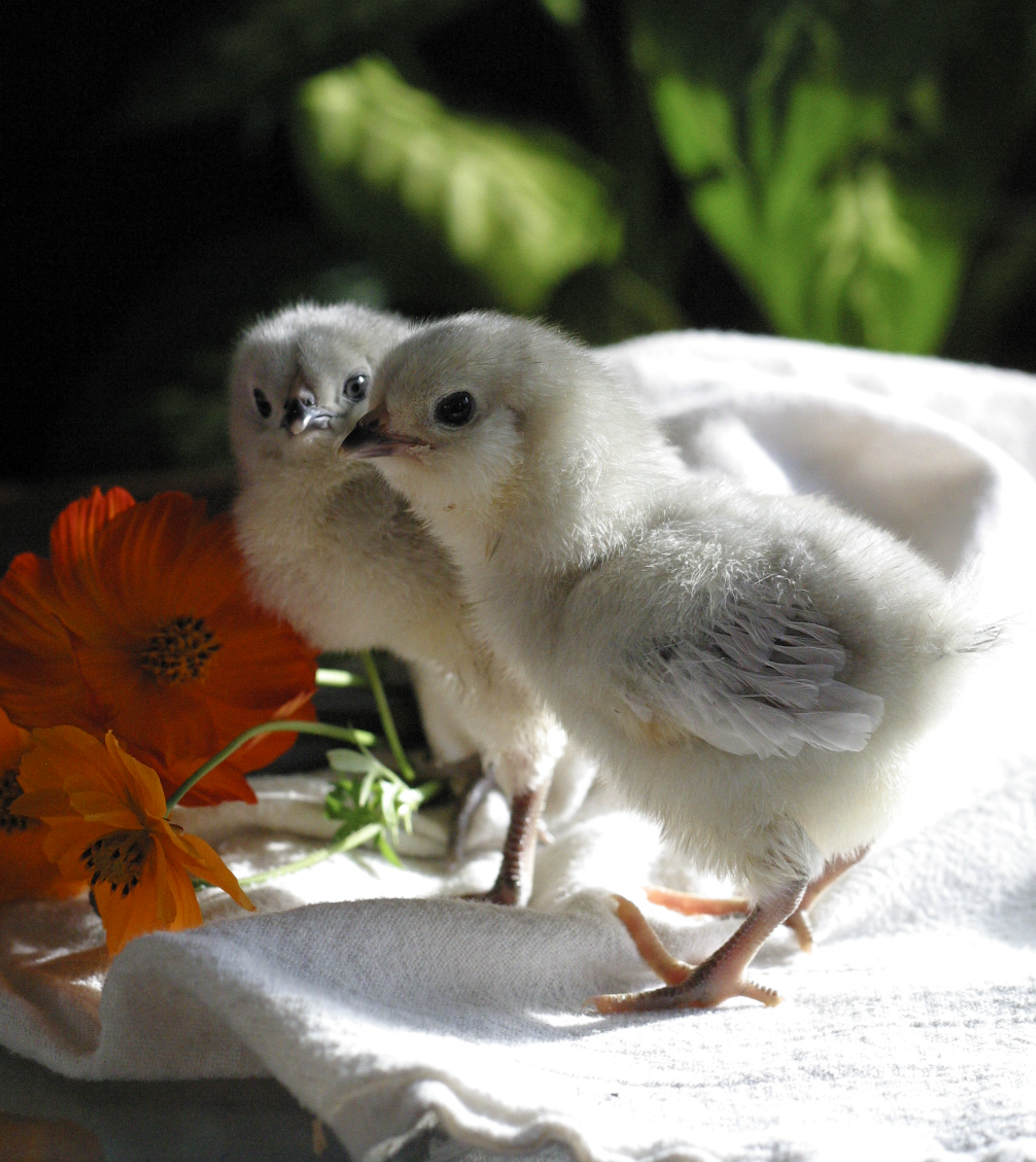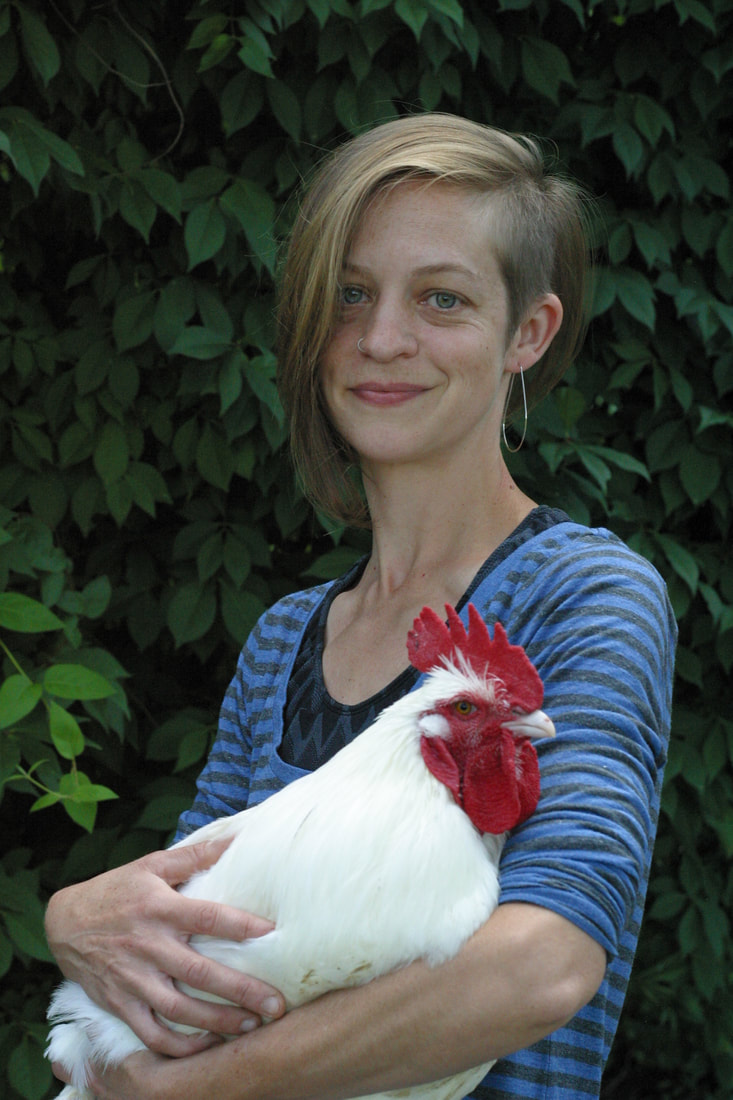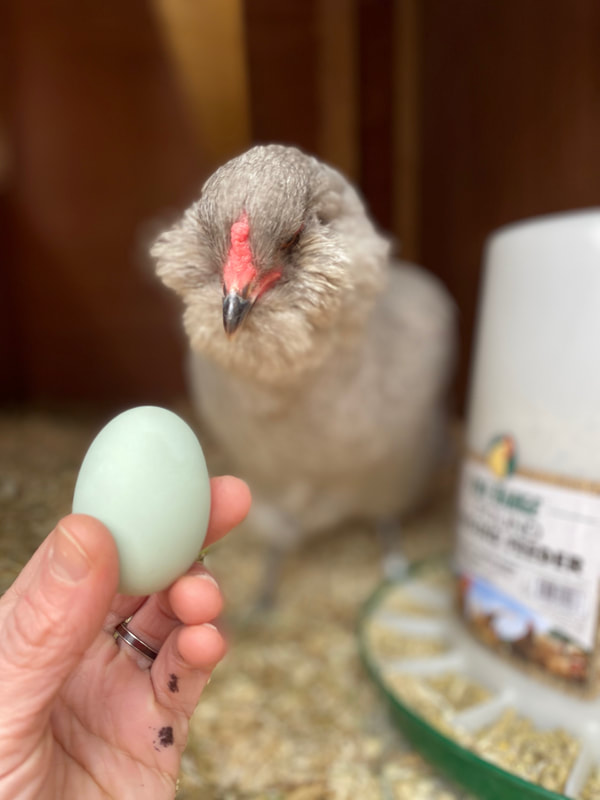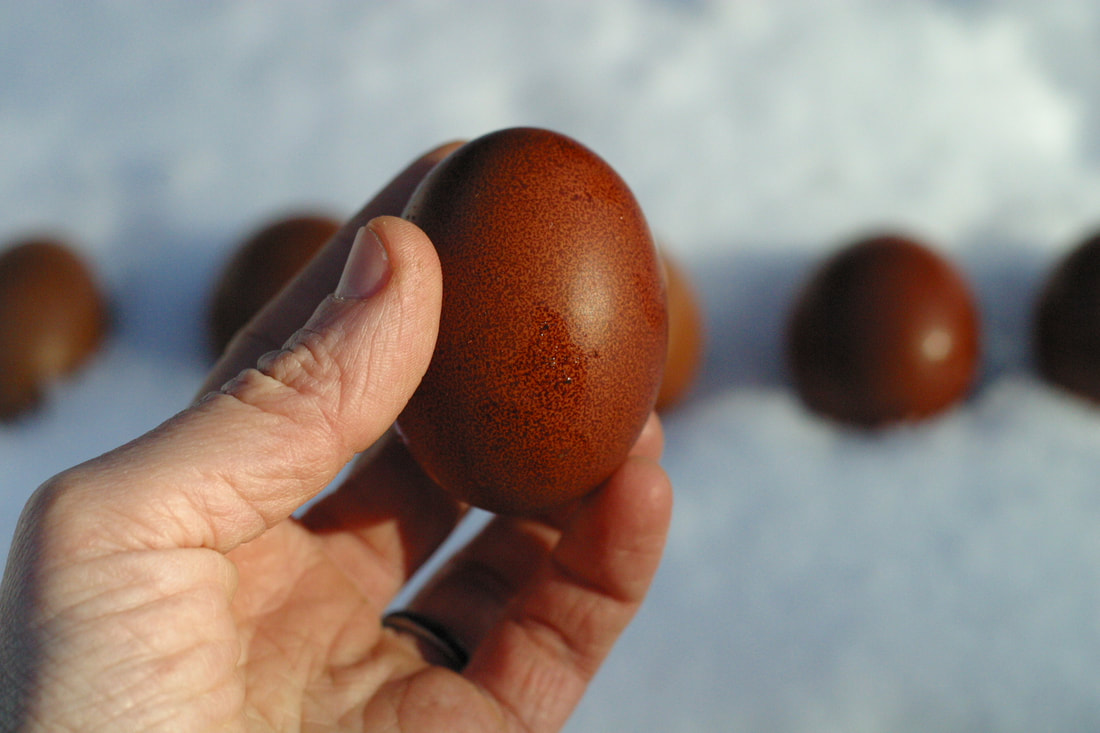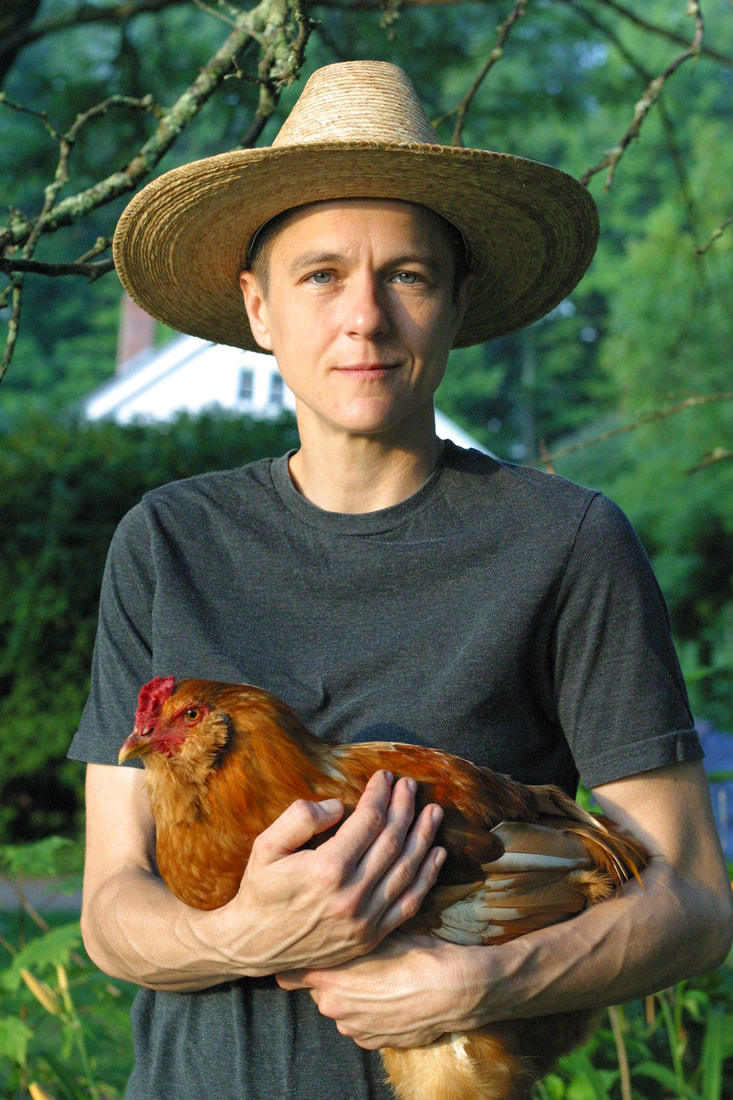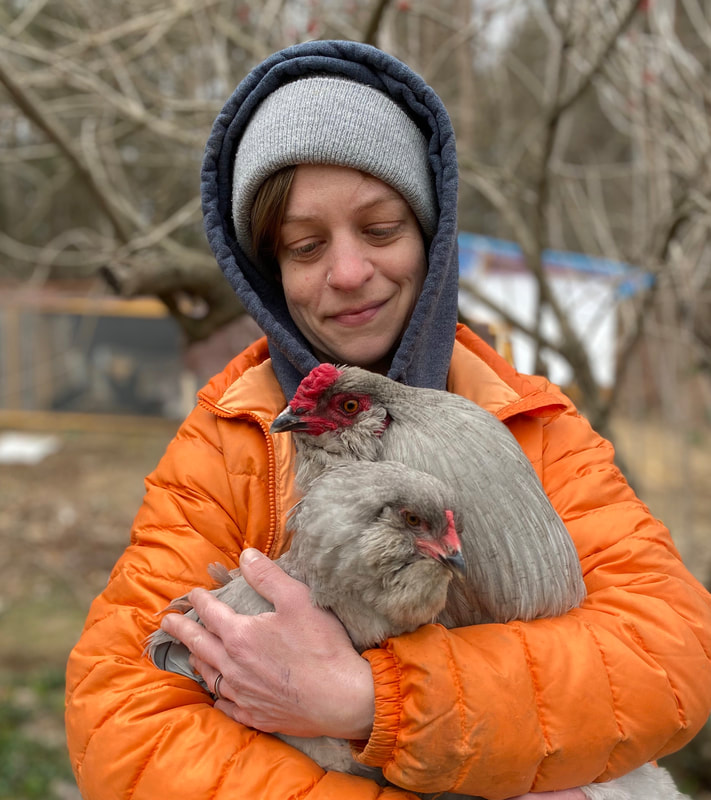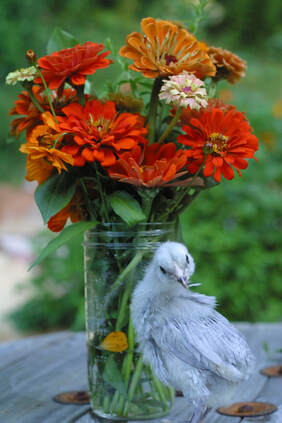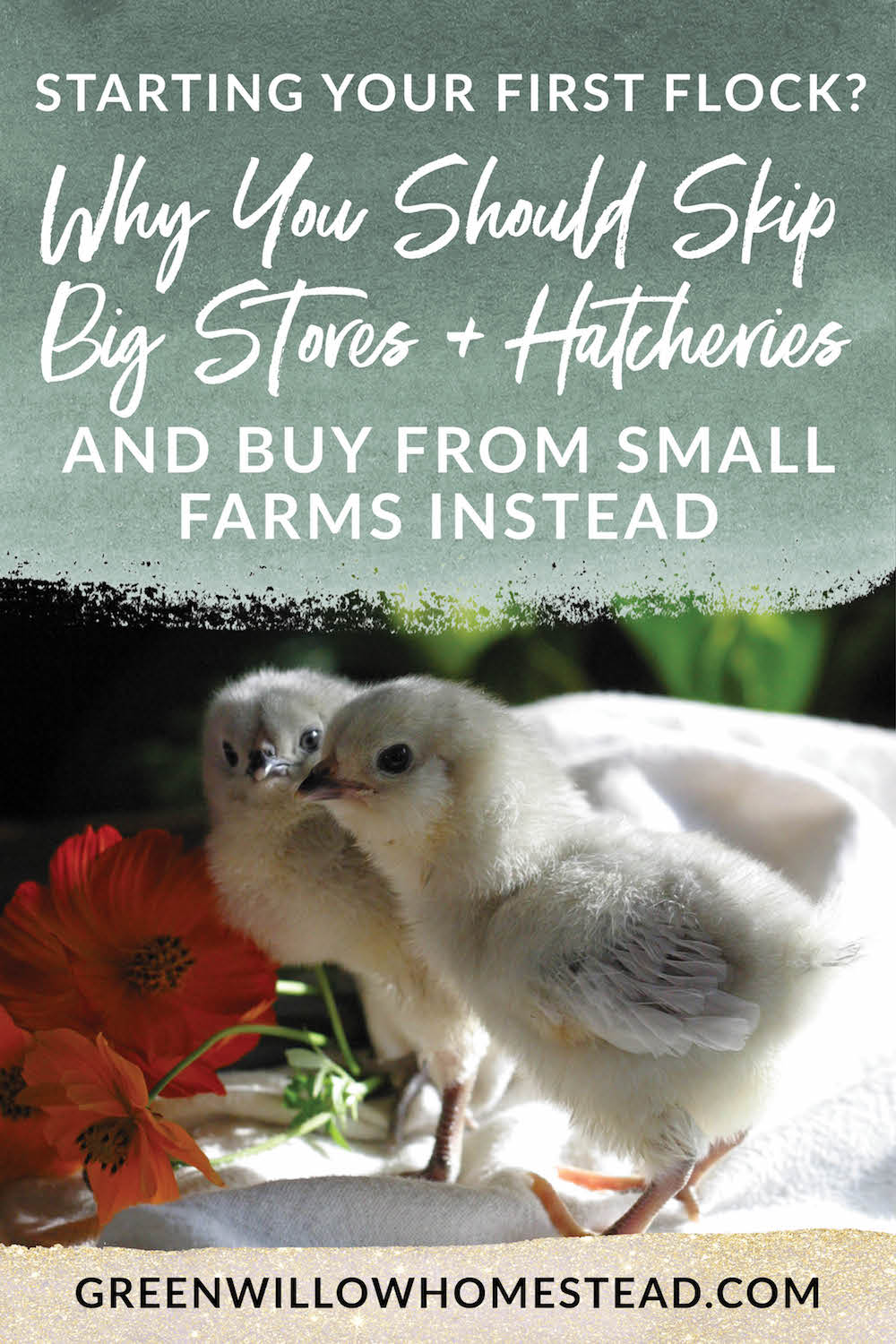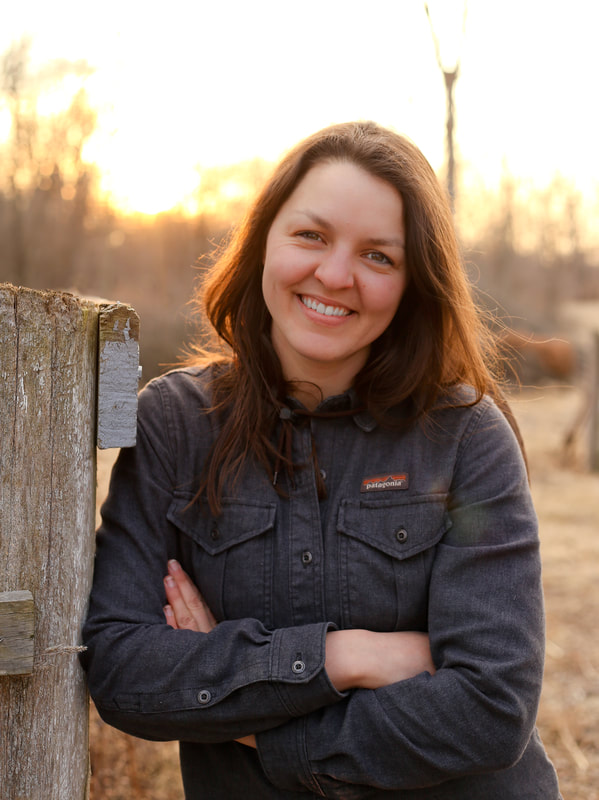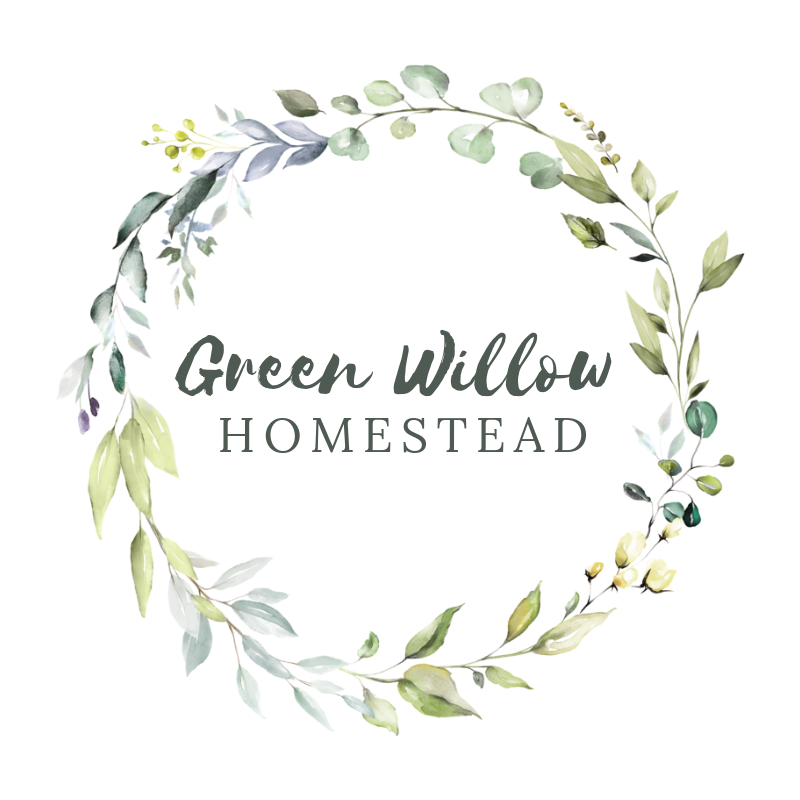|
As more and more of us are jumping into chicken keeping and raising chicks for the first time, I thought it would be helpful to have on an expert chicken tender to teach you why when you are shopping for chicks - you should skip the big stores and hatcheries and buy from a small farm instead. Maeg Yosef runs Silver Fox Farm along with her wife, Sarah, in Greenfield MA. They are a very small poultry farm and humane hatchery who focus on selective chicken breeding for homesteaders, backyard chicken keepers, and small farms. Maeg is bursting with knowledge when it comes to starting your first flock so I can't wait for you to read on. Even I learned something new from this guest post! Hi there. My name is Maeg Yosef. My wife, Sarah and I own and run Silver Fox Farm in Greenfield, MA. Our mission is to help others produce their own meat and eggs, and to give our birds the best life possible. Many years ago, before we fell in love and started this little farm, Sarah and I each had chickens. Like many folks, we both purchased our first flocks from large hatcheries. I went to my local feed store, chose between Buff Orpingtons or Barred Rocks from a major hatchery, and that was that. It didn’t even occur to me at the time that an alternative existed. After Sarah and I moved to our farm, our real chicken adventures began as we discovered the wild and thriving world of small farms and private breeders. There are so many benefits to purchasing chicks from a small farm instead of a large hatchery. Before you start your flock (or add to it), I invite you to consider all of the ways a small farm can help you and your chicks get off to the best start! Chicken Confidential: Straight Talk on Straight Run We all want to know where our food comes from, right? One of the best parts of chicken keeping is knowing exactly that. I believe it’s also important to know where the chickens laying your eggs came from, and how they were raised and treated. There are many animal-welfare related reasons to buy chicks or hatching eggs from a small farm or breeder. I’m going to address the toughest one first: chick culling. Brace yourself - and your heartstrings. If you’ve started shopping for your first flock, you’ve probably come across the terms “sexed” and “straight-run.” Before we define those terms, and discuss their importance, we need to have a little talk about chicken genitalia. Male and female chickens all have the same external genitalia (whoa, I know!). Some breeds or crosses have differences in chick down color that allow a chick to be sexed at hatch, but sexing most breeds requires the help of an expert “vent sexer.” These highly trained experts are able to squeeze a baby chick’s bottom and tell its sex with just a glance at the inner organs. Sexers are employed by large hatcheries, both in commercial egg/meat production and in hatcheries that breed for backyard chicken keepers. An experienced and skilled sexer can sex 1,400 chicks an hour with a 98% accuracy rate. That’s less than three seconds per chick! Impressive, but don’t try this at home. Vent sexing requires great expertise and involves some risk to the chick. It’s potentially fatal. Let’s get back to straight run vs. sexed chicks. If you order straight-run chicks, they have not been sexed and they will be roughly half male, half female. Sexed chicks are all female. Sexed chicks are in HUGE demand, for a few reasons:
All of these reasons are understandable. As we’ve collectively disconnected from our food and how it is produced, this disconnection has manifested in laws around food production and animal keeping in our communities, as well as in our discomfort in producing our own meat. So what happens to all of those unwanted male chicks? Male chicks in large scale hatcheries are often killed at hatch right after they are sexed. This is typically accomplished by grinding, gassing, or suffocating them. Yes, you read that right. This has become a common practice due to the lack of demand for male chicks across all areas of the poultry industry, including companies that cater to backyard chicken keepers. Worldwide, the number of culled male chicks in the poultry industry is in the billions every year. At Silver Fox Farm, and at many other small farms like ours, we value the lives of all our chickens. We do not sex chicks, and we only offer straight-run chicks to our customers. All the chicks we hatch for ourselves are grown out and lead a quality life. After they grow up, we process our extra roosters for food. This is a difficult but necessary part of keeping our flocks happy and balanced with a good hen-to-rooster ratio. We share this experience with friends and family whenever possible. Some have described it as spiritual, and I think everyone walks away with a new appreciation of eating meat. As a poultry breeder, I talk to a lot of folks hoping to buy sexed chicks because they are uncomfortable with the idea of processing their extra roosters. I totally get it. It’s a big step. At the same time, the reality is that purchasing sexed chicks from a large scale hatchery doesn’t save any lives, it just outsources the killing, while at the same time hiding it from view. While purchasing straight-run may seem like an inconvenience, I believe it’s a huge opportunity to connect with your food, provide a good life to all chicks, and vote with your dollar by supporting small, humane hatcheries that practice chick keeping instead of chick culling. Ethical Transparency With Small HatcheriesChick culling is one of the most glaring ethical issues to consider when purchasing chicks. I would encourage you to also consider how the parents of your chicks are treated. Even at the small scale, there is a great deal of variation in chicken farming and breeding practices. Questions you should consider are:
These are all great questions, and I encourage you to seek answers to the ones that are important to you when starting your flock! Purchasing from a small farm can give you great insight into exactly how their flocks are raised. Small farms often share their farming practices on their website or social media. For example, we share ours here. If you contact them with a chicken question, you’ll be hearing back not from a huge company rep but likely from the person who feeds those birds every day. Who quite possibly hatched them herself. Knowing your farmer is a level of transparency and intimacy that helps you make an informed decision when creating the flock of your dreams. However, if you ask to visit a chicken breeder, proceed with caution if they say yes readily. When it comes to breeding and selling chicks and hatching eggs, biosecurity is of the utmost importance. Avian diseases travel easily--on the sole of a boot, the treads of a car tire, even on the wind. If a disease travels to a farm by way of a visitor, it can just as easily travel off the farm in the form of baby chicks and hatching eggs. Good biosecurity is not just about keeping our flocks healthy, but about keeping our customers’ flocks healthy, too! For these reasons, we do not allow visitors to our farm, but we are definitely flattered when people ask for a tour. Some farms with good biosecurity do offer tours--but carefully and selectively, with visitors taking precautions such as wearing protective gear. Don’t be offended if a breeder won’t let you visit--take it as a sign that they are working hard to keep their birds (and yours) safe and healthy. When it comes to biosecurity, a good rule of thumb is to only purchase from farms that are “NPIP certified.” The National Poultry Improvement Program, or NPIP, is a certification system for poultry breeders. NPIP certification (or equivalent) is required for breeders to sell and ship chicks and eggs. We participate by having our birds tested for certain diseases twice a year and following a biosecurity plan. Selective Chicken Breeding: There’s a Farm for That! Another great reason to purchase from a small farm or breeder is the care they can take in practicing selective breeding. Simply put, selective breeding means breeding with a goal in mind, and making progress toward that goal by carefully choosing your breeding stock and developing a breeding program. Over time, year by year, you will see the results in your flock! Selective breeding requires time and an intimate knowledge of your birds. We tag, track, and take notes on each of our chickens throughout their lives and only select the best for our breeding programs. Large scale hatcheries are not able to pay attention to birds on the individual scale. Typically, they set aside the number of birds needed for production and let them mate at will. It’s a necessary strategy for producing a large amount of birds, but the care and work involved in small scale, selective breeding means better birds in your backyard. But why is selective breeding important? What if you just want a few chickens in your backyard? Selective breeding works toward a goal, but every breeder’s goal is different. When dreaming of your first flock (or your next expansion), I am sure you have a vision for your flock. Whatever your chicken dreams may be, there’s a farm for that! There is a breeder out there selectively breeding for that same goal. You get to choose a farm with breeding priorities that resonate with yours. For example, maybe you think it would be fun to enter your birds in local poultry shows. Find someone whose top priority is breeding to the Standard of Perfection (the official criteria for each breed) and produces show-quality birds. Perhaps you are obsessed with egg color. Find a breeder whose focus is tinkering with hues. At Silver Fox Farm, we breed with backyard chicken keepers, small farms, and homesteaders in mind.Therefore, our top breeding priorities are:
Once we select for those top priorities, we look at the Standard of Perfection for our breeds, and then egg color (our hens lay in gorgeous shades of chocolate brown, blue, and green). What does selecting for these breeding goals look like in practice? We keep track of all our birds from hatch onward. If a chicken gets sick, even something relatively common like sour crop, we treat them but never breed them. They join our laying flock instead. Same goes for temperament. A rooster that shows an aggressive temperament will not be bred, even if he is a stunner. By selectively breeding for these traits, we continually improve the health, disease resistance, and sweetness of our flocks (and our customers’, too!). Only after assessing birds for health and temperament do we consider their physical traits by handling and observing them. Do they have any physical defects, like crooked toes or a crooked keel? How do they measure up to the standard for their breed? After this round of selection, our extra hens move to the laying flock and our extra roosters are processed. You get to decide what your priorities are when it comes to your flock. By sourcing your birds from a small farm, you can make sure that your flock is in alignment with those goals. A large scale hatchery just can’t assess each individual bird in its breeding stock, or have goals far beyond sheer numbers. Relationships, Service, and Flexibility: Small Hatcheries Are Here For You As I write this, our world is in the throes of a pandemic. Our mission of helping others produce their own food feels more relevant than ever. At the same time, we are all living in a great deal of uncertainty. Sarah and I are committed to filling orders while also remaining flexible and supporting our customers in any way we can: filling orders early, making last minute substitutions, canceling a chick order from a customer in another state when police told him to turn his car around and go home because his errand was not essential (another customer was happy to take them!). Of course, due to the nature of working with living creatures, only so much flexibility is possible! It will always take 21 days to go from egg to chick, and a hen will never lay more than an egg a day. But small farms are uniquely positioned to offer extra attention and flexibility to their community, and to develop a relationship with each customer. This is true regardless of current events. I love that when people send us an email, they take the time to tell us about their flock. I love that folks can find my number on our site and shoot me a text, or see us doing chicken yoga on our Instagram. I love it when someone sends me a photo of a chick just hatched from one of our eggs, or when I can give someone advice about building their first coop. These relationships are not just a business transaction. They’re a shared passion. And you just can’t get that on a large scale. Your chickens are an intimate part of your life - not just food, but also companions. It makes sense to select them from a small farm that cares for their birds with the same attention and love that you give to yours.
3 Comments
Kelsey
4/10/2020 10:28:14 am
You are so welcome Maeg! Thank you for sharing your knowledge!
Reply
Lauren
10/11/2020 09:50:51 am
Love this! Do you have suggestions of how to find small hatcheries that do meat birds? We have our connections for layers but have struggled to find meat bird options.
Reply
Leave a Reply. |
Meet Kelsey,Thanks for stopping by Green Willow Homestead! From chicken rearing to composting, we've got our hands full and we love sharing what we've learned along the way. Follow along as we turn the 80 acres we call home into a farm that serves its community and a homestead that nourishes us throughout the seasons. Grab the EbookListen in!FREE Guide!Tune in to our YouTube ChannelInspirationsCategories
All
Favorite Books of 20241. Erosion
2. Braiding Sweetgrass 3. As Long As Grass Grows 4. The Small Scale Poultry Flock 5. The Zero Waste Solution Archives
April 2024
|
FOLLOW KELSEY ON INSTAGRAM!
As an Amazon Associate I earn from qualifying purchases. |

